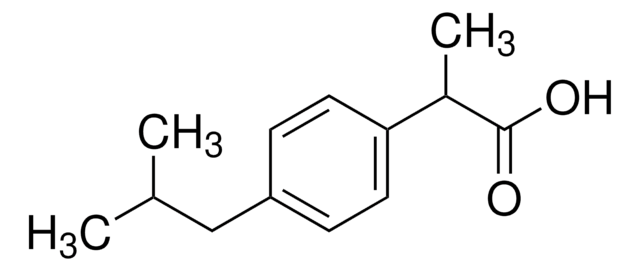496100
Omeprazole
A cell-permeable pyridyl methylsulfinyl benzimidazole compound that acts as selective proton pump inhibitor.
Synonym(s):
Omeprazole, H 168/68, 5-Methoxy-2[(4-methoxy-3,5-dimethyl-2-pyridyl)methylsulfinyl]-1H-benzimidazole
About This Item
Recommended Products
Quality Level
Assay
≥94% (HPLC)
form
solid
manufacturer/tradename
Calbiochem®
storage condition
OK to freeze
protect from light
color
tan to off-white
solubility
DMSO: 25 mg/mL
cation traces
heavy metals: ≤20 ppm
shipped in
ambient
storage temp.
2-8°C
InChI
1S/C17H19N3O3S/c1-10-8-18-15(11(2)16(10)23-4)9-24(21)17-19-13-6-5-12(22-3)7-14(13)20-17/h5-8H,9H2,1-4H3,(H,19,20)
InChI key
SUBDBMMJDZJVOS-UHFFFAOYSA-N
General description
Biochem/physiol Actions
proton pump
Packaging
Warning
Reconstitution
Other Notes
Besancon, M., et al. 1997. J. Biol. Chem.272, 22438.
Sachs, G., et al. 1995. Ann. Rev. Pharmacol. Toxicol.35, 277.
Diaz, D., et al. 1990. Gastroenterology99, 737.
Fellenius, E., et al. 1981. Nature290, 159.
Legal Information
Signal Word
Warning
Hazard Statements
Precautionary Statements
Hazard Classifications
Acute Tox. 4 Oral - Aquatic Chronic 2 - Skin Sens. 1
Storage Class Code
11 - Combustible Solids
WGK
WGK 2
Flash Point(F)
Not applicable
Flash Point(C)
Not applicable
Certificates of Analysis (COA)
Search for Certificates of Analysis (COA) by entering the products Lot/Batch Number. Lot and Batch Numbers can be found on a product’s label following the words ‘Lot’ or ‘Batch’.
Already Own This Product?
Find documentation for the products that you have recently purchased in the Document Library.
Our team of scientists has experience in all areas of research including Life Science, Material Science, Chemical Synthesis, Chromatography, Analytical and many others.
Contact Technical Service






